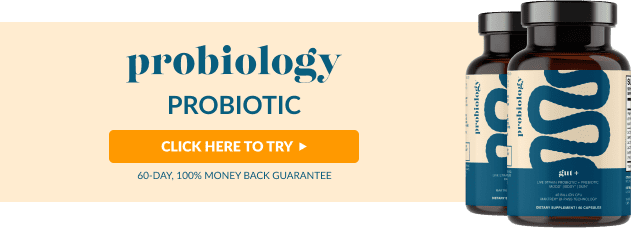Probiotics are dietary supplements that contain live microorganisms. They are believed to provide several health benefits which include improved gut health.
Not only can they help us to digest food but they can also help with skin conditions and introducing probiotics to your daily routine can result in a healthier immune system.
There are conflicting opinions regarding the best time to take probiotics with some suggesting that they should be taken on an empty stomach and others suggesting that they should be taken after eating.
If you are considering taking probiotics, you may now be wondering what the best time of day for probiotics is. We have provided you with the answers in our guide below.
Why is Timing Important?
Now you may be wondering whether or not it is important to take your probiotics at a certain time. Simply put, when it comes to taking any sort of supplement, consistency is key.
If you do not have a routine in place and instead choose to take your probiotics at random times each day, chances are that you are more likely to forget about them and they are going to be ineffective in their purpose.
The guidance that you are provided with can differ between manufacturers. While some of them advise you to take them on an empty stomach, other manufacturers recommend that you take them either with food or just after eating.
Do You Take Probiotics On An Empty Stomach?
High-quality probiotics will travel through your stomach intact and then move into the small and large intestines, also known as the colon in digestive system.
This is where they work the best and most nutrients are absorbed in the small intestine. The stomach contains acidic fluid designed to help begin digesting food and kill any harmful bacteria that enter our bodies via water or food. If the bacteria in the probiotics sits in the stomach for too long, there is a risk of the acid killing them.
For this reason, some manufacturers suggest that the best time to take the probiotics is on an empty stomach roughly 2 to 3 hours after your previous meal and at least 30 minutes before you are next expecting to eat.
Doing so is thought to give the probiotics a better chance of surviving and moving through your stomach and reaching your intestines intact.
Should You Take Probiotics During Mealtime or After Eating?
There are many suggestions that probiotics should be taken with a meal or shortly after eating rather than on an empty stomach.
The reason for this relates to the pH balance. Essentially, the acidity of the stomach is described as pH. If your stomach has a lower pH it is more acidic, but if it has a higher pH it is less acidic and a better milieu for the probiotics.
An empty stomach has a lower pH, and this can make it difficult for the probiotics to survive. However, just after we eat, the pH of our stomach rises and it becomes much less acidic.
As such, the probiotics have a greater chance of surviving and making it to our intestines.
Some probiotics are considered to be more effective when ingested at the same time as a meal or within 30 minutes of finishing a meal, rather than more than 30 minutes after you finish eating.
This is because, after half an hour, the pH levels in your stomach begin to drop and the environment starts to become more acidic, making it more difficult for the probiotics to survive.
What Type Of Foods And Meals Influence Stomach Acidity?
There are certain foods that we eat that influence the levels of acidity in our stomachs. Probiotics contain microorganisms that are tested to withstand the conditions that they are likely to encounter in our stomachs. Despite this, eating certain foods is going to optimize the effectiveness of the probiotics.
According to a study conducted previously, probiotics that are taken alongside low-fat milk or oatmeal have a greater chance of surviving the conditions in our stomachs. Moreover, unrefined plant foods are mainly alkaline and they also contain a source of fiber that feeds the probiotics.
Again, this gives them a better chance of surviving. Furthermore, certain foods contain healthy fats. Probiotics that are taken alongside these foods have a much greater chance of surviving in the gut.
Taking them with a meal will reduce the levels of acid in your intestines as well as your stomach, ultimately giving the probiotics a better chance of survival.
Should You Take Probiotics After Eating A Large or Heavy Meal?
Generally, taking probiotics right after eating a heavy meal is not advised. This is because when we eat a lot of food our stomachs produce more acid.
Also, a heavier, larger meal takes longer to empty out of the stomach. Probiotics will end up spending more time in the acidic stomach and may be killed.
For this reason, it is recommended that you take them alongside a snack or a small meal that is easily digestible.
Are There Any Side Effects Of Taking Probiotics At The Wrong Time?
The majority of people tolerate probiotics fairly well. Some people may experience a few minor symptoms such as bloating or gas but these do not typically tend to be long lasting and in most cases, they improve over time with continued use.
- Read More: Do Probiotics Cause Gas?
It is unlikely that you will encounter any severe issues regardless of the time of day that you take them. While some individuals may choose to take them when they get up in the morning so that they do not forget, others may prefer to wait and take them before they go to bed at night.
If you take your probiotics and continue to experience the mild side effects that we have mentioned above, it may be the case that the supplements you are taking are not quite right for you.
Taking probiotics while you are on antibiotics is safe so long as you allow a few hours to pass in between taking them. You should discuss the suitability of probiotics if you are taking any other types of medication and discuss with your doctor if any specific species of probiotics are recommended for your symptoms.
Final Thoughts
As you can see the best time to take probiotics is largely going to depend on the type that you take and the manufacturer’s guidance.
There are arguments to suggest that they are best taken on an empty stomach and other arguments that testify against this, instead of suggesting that they should be taken with a meal.

For more probiotics articles, read these to learn more:

